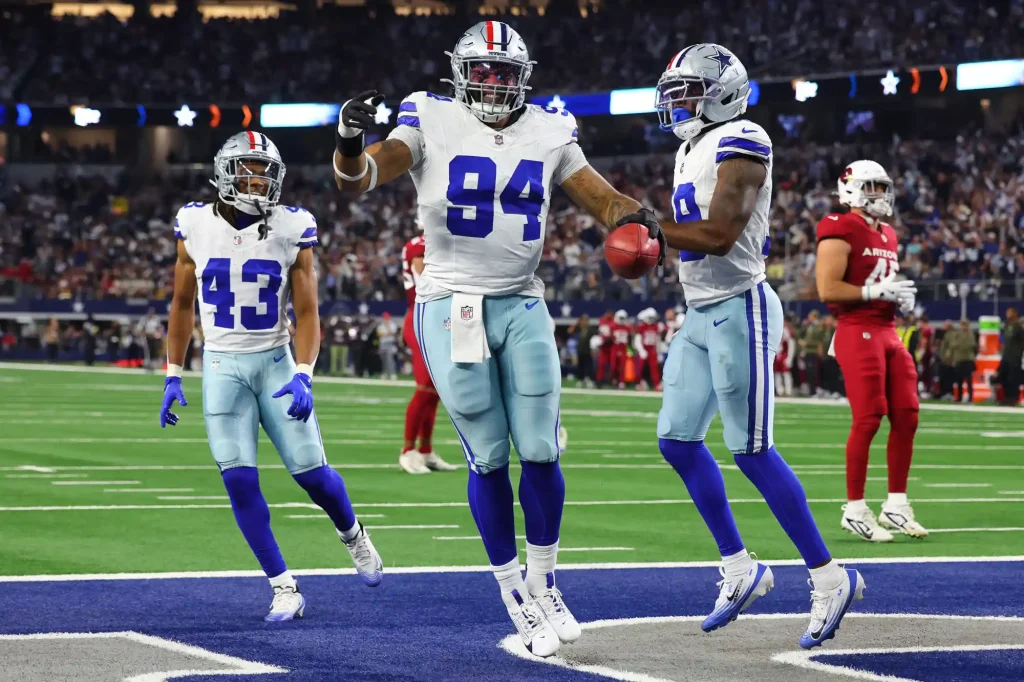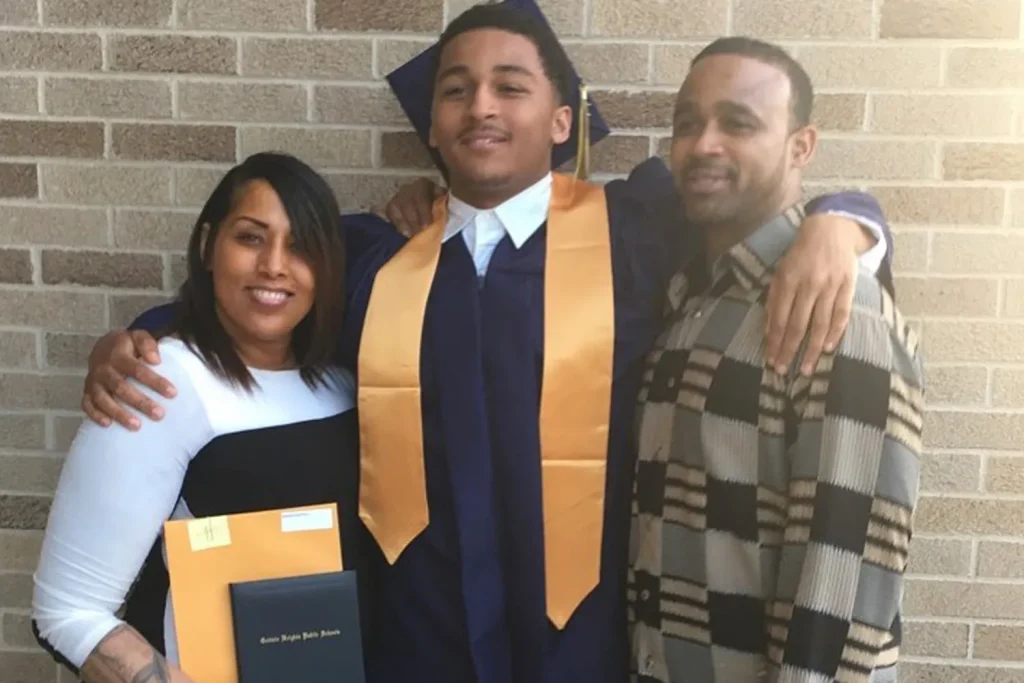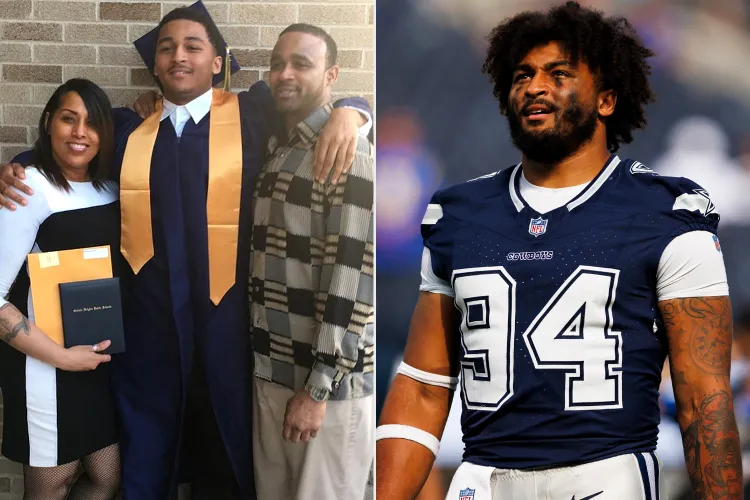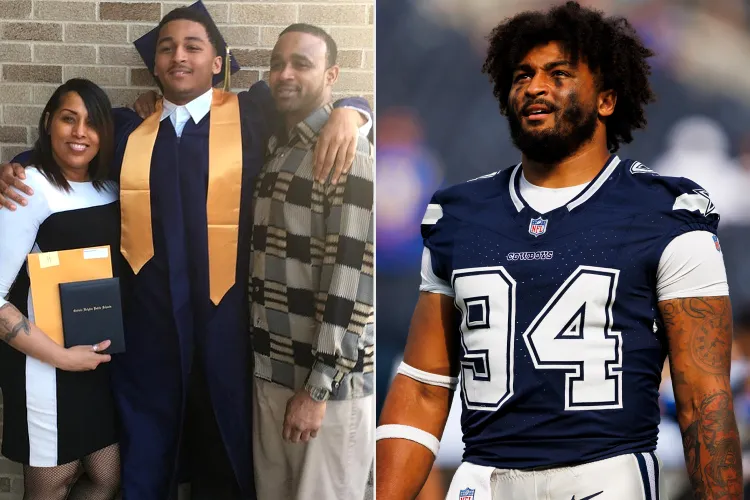Dallas Cowboys Star Marshawn Kneeland Carried His Mother’s Ashes in a Necklace After Her Death — A Year Later, the NFL Mourns His Own Tragic Passing
Marshawn Kneeland’s story is one that now sits painfully in the space between triumph and tragedy. The 24-year-old Dallas Cowboys defensive end, whose rising career symbolized persistence and heart, carried with him a deeply personal reminder of his late mother, Wendy Kneeland — her ashes, encased in a necklace that rarely left his neck. It was his way of keeping her close, even as life moved him further from home and into the brightest, most demanding stage of his young life.

A year before his own sudden death, Marshawn had lost the woman who shaped his dreams and believed in his ability long before the NFL ever did. Wendy’s passing came just before the 2024 NFL Draft — a moment that should have been filled with joy and celebration. Instead, Marshawn entered the professional ranks carrying an invisible grief, hidden under the pads and helmet that millions would come to recognize on Sundays. His mother had been the constant voice in his life, the foundation of his drive. When she was gone, he found a way to make her presence tangible — a silver chain containing a small portion of her ashes, worn daily, pressed against his chest before every practice, every game, every milestone.
Friends say Marshawn’s bond with his mother was unbreakable. Even as he grew into the stature of an NFL athlete — 6′ 3″ and 270 pounds of disciplined muscle — he remained the same quiet, grounded young man from Grand Rapids, Michigan. “His mom was everything to him,” said one former Western Michigan teammate. “He used to say, ‘When I make it, I’m making it for her.’ ”
Wendy Kneeland was known as a fiercely supportive and loving mother, the kind of parent who showed up to every high-school football game regardless of the weather, who believed her son could achieve greatness even when resources were scarce. Those who knew the family recall her radiant smile and her tireless encouragement. “She used to tell him, ‘You’re going to be somebody special,’ ” a close family friend told reporters after Marshawn’s death. “And he believed her.”
When Marshawn was drafted by the Dallas Cowboys in April 2024, just months after her passing, he described it as both a dream come true and a bittersweet victory. “It’s everything we talked about,” he told a local station at the time. “I just wish she could see it.” In a quiet post on social media that spring, he revealed the necklace for the first time — a small, stainless-steel pendant containing a portion of his mother’s ashes. “Forever with me,” the caption read. It was the only public acknowledgment he ever made of it.
Those close to the young player say that wearing his mother’s ashes was both a comfort and a daily reminder of purpose. During practices, the necklace would sometimes tuck beneath his jersey. During games, he would hold it briefly before kickoff. “He said it gave him strength,” another friend said. “He told us, ‘As long as I’ve got this, I’ll never be alone out there.’ ”

Marshawn’s rookie year with the Cowboys showed promise. He was respected in the locker room for his maturity and humility, a first-year player who carried himself like a veteran. Coaches often spoke about his work ethic, how he arrived early, stayed late, and rarely complained. “He was the kind of guy you root for,” one team staffer said. “Quiet, disciplined, a good teammate. He loved the game, and he loved his family.”
Then came Wednesday night, November 5, 2025 — the night that would end a promising life too soon. Police were called to Marshawn’s Dallas-area home for a welfare concern, and by the time they arrived, the 24-year-old was gone. Authorities have not released an official cause of death, and the investigation remains ongoing. The Cowboys confirmed the news early Thursday morning in a statement filled with heartbreak. “It is with extreme sadness that the Dallas Cowboys share that Marshawn Kneeland tragically passed away this morning. We extend our love, prayers, and deepest condolences to his family and friends.”
For many in the football community, the loss is still impossible to process. In less than two years, Marshawn went from being one of the most promising young defenders in the league to another reminder of how fragile life can be — even for those who seem unstoppable. The revelation that he had been wearing his mother’s ashes since her death only deepened the emotional response from fans and fellow players.
Across social media, tributes poured in. Former teammates from Western Michigan University, where Marshawn first made a name for himself, shared memories of his leadership and his kindness. Cowboys players posted photos and heartfelt messages, many referencing his devotion to his family. “He played for his mom every snap,” one wrote. “Now they’re together again.”
Those who watched him rise through the college ranks remember a young man who turned pain into performance. After Wendy’s passing, Marshawn reportedly considered stepping away from football to grieve but decided instead to honor her by continuing. “She would’ve wanted him to keep going,” said an old friend. “That’s what he kept saying. ‘She wouldn’t want me to stop now.’ ”

Marshawn’s father, a private man who stayed out of the spotlight, had stood proudly beside him during his graduation and draft day ceremonies. The family photo — Marshawn in his blue gown, Wendy beaming at his side — has resurfaced online, a hauntingly beautiful snapshot of a mother and son whose story was defined by love and perseverance.
As the news spread, fans began leaving flowers and notes outside the Cowboys’ training facility in Frisco, Texas. Many mentioned Wendy, referencing the necklace that symbolized their connection. One message read, “You carried her with you every step of the way — now she carries you home.”
Within the NFL community, Marshawn’s passing has sparked conversations about emotional resilience, mental health, and the human cost of the game. League officials and players’ associations have once again highlighted the need for ongoing psychological support for athletes navigating personal grief under public scrutiny. “People forget that these players are human beings,” said one sports psychologist familiar with the Cowboys organization. “They face enormous pressure while carrying very real pain.”
Marshawn’s memory is being celebrated not for his statistics or on-field accolades, but for the person he was — a young man who never forgot where he came from, who stayed humble in success and gracious in hardship. His teammates recall a player who listened more than he spoke, who would quietly motivate others by example rather than loud speeches. “He wasn’t the guy shouting in the locker room,” one player said. “He was the guy who showed up every day, worked hard, smiled, and did his job.”
The necklace now stands as a symbol larger than anything Marshawn could have imagined. It represents the love between a mother and her son, the invisible threads of faith and memory that outlast even the greatest achievements. For Wendy Kneeland, whose belief in her son pushed him to greatness, that connection will forever be part of his story. For those who watched his rise and mourn his loss, it serves as a quiet reminder that love — in all its forms — transcends even tragedy.
As the Cowboys prepare to honor his life in a future memorial, tributes continue to flood in from across the league. Fans are sharing photos of Marshawn smiling with his family, recalling his infectious positivity and humility. “He wore her ashes, but he also wore her heart,” one fan wrote. “Everything he did carried her spirit.”
For Marshawn Kneeland, the necklace wasn’t just jewelry — it was a piece of his soul, a link to the person who had given him everything. Now, as both mother and son rest side by side, that bond remains unbroken. Their story is one of loss, yes, but also of extraordinary love — the kind that defines a life far more deeply than the game ever could.


